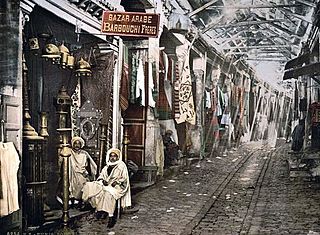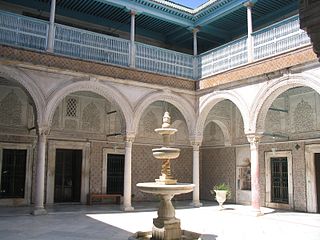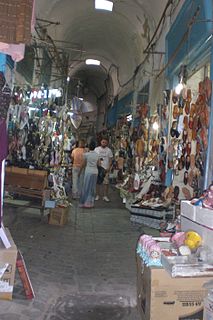This article needs additional citations for verification .(April 2017) (Learn how and when to remove this template message) |

Souk El Bey is one of the souks of the medina of Tunis.
This article needs additional citations for verification .(April 2017) (Learn how and when to remove this template message) |

Souk El Bey is one of the souks of the medina of Tunis.

The souk is near Souk El Berka, Souk Ech-Chaouachine as well as Dar El Bey, [1] which is where the government center is located.
Initiated by Hammuda ibn Ali, it is specialized in trading carpets as well as silk textiles and chachia which was the most important industry in the 19th century.
Today most traders deal in jewellery and precious stones.

Tunis is the capital and largest city of Tunisia. The greater metropolitan area of Tunis, often referred to as "Grand Tunis", has about 2,700,000 inhabitants. As of 2020, it is the fourth-largest city in the Maghreb region and the sixteenth-largest in the Arab world.

Ali Bey was the Husainid Bey of Tunis from 1882 until his death. He was the first ruler under the French protectorate.

The Medina of Tunis is the medina quarter of Tunis, the capital of Tunisia. It has been a UNESCO World Heritage Site since 1979.
Hammuda Pasha Bey, died 1666 was the second Bey of the Tunisian Muradid dynasty. He reigned from 1631 until his death.

Souk El Berka is one of the souks of the medina of Tunis. The market traders specialize in the jewellery trade.
Souk Ech-Chaouachine is one of the souks of the medina of Tunis. Divided into three parts, it is specialized in chachia trading.

Souk En Nhas is one of the souks of the medina of Tunis. It is specialised in selling copper utensils.

Souk El Bchemkya is one of the souks of the medina of Tunis. It used to be specialised in selling bechmak.

The souks of Tunis are a set of shops and boutiques located in the medina of Tunis, capital of Tunisia. Most of the souks were built under the Hafsid dynasty in the 13th century and near the Al-Zaytuna Mosque.

Souk Es Sabbaghine is one of the souks of the medina of Tunis.

Souk El Kmach or the fabrics market is one of the most important souks of the medina of Tunis. It is the place where fabrics and tissues are sold, whether they are made in Tunisia or luxury products especially imported like silk or linen.

Souk El Attarine, or souk of spice traders, is the name by which most spice markets are referred to in Arab countries in the Middle East. Old cities were often divided into segments based on what was sold - meat, spices, fabrics and so on - and attarine, which means spice traders in Arabic, refers to the spice market.

Souk El Leffa, also called Souk of Djerbians, is one of the souks of the medina of Tunis. It is called as such because it was mainly occupied by merchants from the Tunisian island of Djerba.

Souq Al Bchamkiya is a former souk of the medina of Tunis, specialized in bechmak trading.

Souk El Marr is one of the souks of Tunis. Its products are diverse items of daily use.

Souk El Trouk is one of the souks of the medina of Tunis. It is specialized in clothing and embroidery trading.

Souk El Blat is one of the souks of the medina of Tunis, specialized in medicinal plants.

Dar Ben Abdallah is an old palace in the medina of Tunis.

Souk El Blaghgia is one of the souks of the medina of Tunis.

Souk Erbaa is one of the souks in the medina of Tunis.